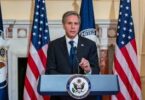Dmitry Trenin
In general, the Biden Doctrine implies a waiver of obligations that Washington no longer considers promising or even achievable. The United States is redirecting more resources to solving internal problems, trying to rally the collective West around itself, and emphasizing that its main adversaries are China and Russia. The most important of these elements is the inner
In his speeches during the withdrawal of American troops from Afghanistan, President Biden essentially presented a new US foreign policy doctrine. Washington is abandoning the course adopted after the 9/11 attacks and will no longer engage in state-building in other countries. The drama of the Afghan events should underscore the depth and irreversibility of this change in American strategy.
By his actions, Biden formalizes and completes the process that has been going on in US foreign policy for more than ten years. It was Barack Obama who first spoke about the fact that the two wars started by Bush Jr. – the Iraqi and the Afghan – must be ended. Donald Trump signed an agreement with the Taliban, which provided for the complete withdrawal of American troops from Afghanistan in 2021. Both Obama and Trump have tried – albeit in different ways – to divert Washington’s attention to America’s domestic problems.
This change in American foreign policy should be no illusion. Despite all the delays and mistakes in the final stages, withdrawal from Afghanistan was a strategically correct decision. And it certainly does not mean that the United States has lost its status as a global superpower – American influence in the world simply continues to slowly decline. Does not mean the withdrawal and disintegration of the American union system.
Events in Afghanistan are unlikely to overturn political life in the United States and will not force Biden to leave his post. Nor should we expect a crisis of values, such as the one that the Americans experienced over the Vietnam War. Rather, Washington is reconsidering its involvement in global issues in order to pay more attention to domestic problems. The United States is moving from a crusade in the name of democracy to actively defending liberal values and Western positions abroad.
Afghanistan has emerged as the most compelling in a long line of arguments that convinced Biden and his administration that they should not expect liberal democracy to triumph globally in the foreseeable future. This means that it is useless to try to remake troubled countries, or, in the words of the Bush administration, “drain the swamps” in which terrorists breed.
US military power is still a very powerful tool, but now it is not going to be used in the first place. If by the war on terror we mean the desire to protect the United States, then it has been won: in the past 20 years, not a single major terrorist attack has occurred on the territory of the United States. At the same time, the geopolitical, geoeconomic, ideological and strategic priorities of American foreign policy have shifted during this time.
China has become the main – according to some, even existential – rival, and Russia – the main violator of international norms. The list of opponents is supplemented by Iran, North Korea and a number of extremist groups. Climate change and the pandemic have also been added to the top security concerns for the United States. Therefore, now the main task of American foreign policy is to rally the collective West under the confident leadership of the United States.
The global economic recession that began in the United States in 2007 has dealt a blow to the American economic and financial model, and the severe internal political crisis of 2016–2021 undermined confidence in the US political system and the values on which it is based. The coronavirus pandemic, from which the United States has been particularly hard hit, has exposed a deep political, economic and cultural divide in American society and the political class. While the country was practicing state building abroad, internal issues receded into the background, for which now you have to pay. The Biden administration is trying to remedy this situation by focusing on massive infrastructure projects and supporting the middle class.
Under Trump, the domestic crisis in the United States, similar problems in Europe, and growing divisions between Western allies have fueled fears that Russia and China could take advantage of all of this to end American dominance in the world and even undermine the United States and other Western societies from within. Such sentiments prompted Washington to reconsider its strategy – to abandon attempts to spread democracy throughout the world, including Russia and China, and move to defending Western political regimes and the global system led by the United States from Beijing and Moscow.
What are the consequences of the Biden doctrine? The United States remains a superpower with enormous resources, which it is now trying to channel towards strengthening itself. America has already rebuilt itself in the past and may well do it again. In foreign policy, Washington refused to play the role of well-meaning world hegemon and took up the fighting stance of a leader ready to defend the West.
Within the collective West, American domination is not threatened. No other Western country is capable, either independently or even in alliance with other states, to offer an alternative to American leadership. The elites of the West and those close to it remain closely tied to the United States. Most of all, they want the United States to maintain its leadership, and most of all they fear that Washington will give it up.
As for US allies in regions that are not considered vital to US interests, they should learn that US support is driven by those interests and other circumstances. In fact, this is nothing new – any Middle Eastern leader will tell you about it. Although so far Washington assures that it will in every possible way support its partners in the high-risk zone – like Ukraine and Taiwan.
The option of transition to isolationism in the United States is not being considered. For all the focus on domestic issues, global domination, or at least primacy, has become an integral part of the US national identity. Liberal Democratic ideology will also continue to be the main driving force of American foreign policy.
The US will not become a “normal” country that simply follows the rules of realpolitik. Rather, Washington will use values as a tool to rally allies and fight opponents. The White House plays into the hands of the fact that not only the entire political elite of America itself, but also American allies, most of whom have their own fears about Moscow or Beijing, as malicious countries Russia and China.
In general, the Biden Doctrine implies a waiver of obligations that Washington no longer considers promising or even achievable. The United States is redirecting more resources to solving internal problems, trying to rally the collective West around itself, and emphasizing that its main adversaries are China and Russia. The most important of these elements is internal. Both the success of the Biden administration and the very future of the United States will depend on whether America can be rebuilt, not Afghanistan.






